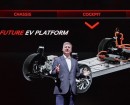Everybody knows about the infamous “billionaire space race,” but there also seems to be a “hydrogen mobility race” taking place quietly behind the scenes. Of course, it’s not about individual billionaires but hybrid and electric vehicle manufacturers.
Obtaining their own hydrogen on a large scale would certainly give EV car makers the upper hand in a future scenario where all vehicles on the road depend on renewable energy sources. Also, hydrogen fuel cell technology is evolving slowly but surely. It wasn’t considered efficient enough for large-scale operations only a few years ago, but it has since advanced to the forefront of green alternatives pretty fast.
Not too many people are familiar with Hyundai Mobis, the less famous “sibling” of Hyundai and Kia. A supplier for both brands, ranking number seven among global automotive suppliers, the Seoul-based company is also determined to obtain fuel cell production supremacy.
Hyundai Mobis just broke ground on a new plant that will make hydrogen fuel cell stacks at the Industrial Complex in Cheongna International City, Incheon. President Moon Jae-in and Deputy Prime Minister Hong Nam-ki were also present at the opening ceremony, another indication of the strategic significance of the new plant. A second production facility will soon follow in Ulsan.
Together, these new plants will produce 100,000 hydrogen fuel cells per year. This is huge, considering that the company’s first fuel cell plant, which began operating in 2018, has an annual capacity of about 23,000 hydrogen cell systems. When the new plants become active, Hyundai Mobis will officially have the world's largest fuel cell production capacity.
The Korean company has invested over $1.1 billion (KRW 1.3 trillion) into the new fuel cell plants, and the increased capacity will be used not just to advance EV manufacturing but also to expand production lineups to other industry sectors, such as hydrogen-powered machines for construction and logistics.
The two new plants with an estimated capacity of 100,000 hydrogen fuel cells are expected to start mass production in the second half of 2023.
Not too many people are familiar with Hyundai Mobis, the less famous “sibling” of Hyundai and Kia. A supplier for both brands, ranking number seven among global automotive suppliers, the Seoul-based company is also determined to obtain fuel cell production supremacy.
Hyundai Mobis just broke ground on a new plant that will make hydrogen fuel cell stacks at the Industrial Complex in Cheongna International City, Incheon. President Moon Jae-in and Deputy Prime Minister Hong Nam-ki were also present at the opening ceremony, another indication of the strategic significance of the new plant. A second production facility will soon follow in Ulsan.
Together, these new plants will produce 100,000 hydrogen fuel cells per year. This is huge, considering that the company’s first fuel cell plant, which began operating in 2018, has an annual capacity of about 23,000 hydrogen cell systems. When the new plants become active, Hyundai Mobis will officially have the world's largest fuel cell production capacity.
The Korean company has invested over $1.1 billion (KRW 1.3 trillion) into the new fuel cell plants, and the increased capacity will be used not just to advance EV manufacturing but also to expand production lineups to other industry sectors, such as hydrogen-powered machines for construction and logistics.
The two new plants with an estimated capacity of 100,000 hydrogen fuel cells are expected to start mass production in the second half of 2023.






